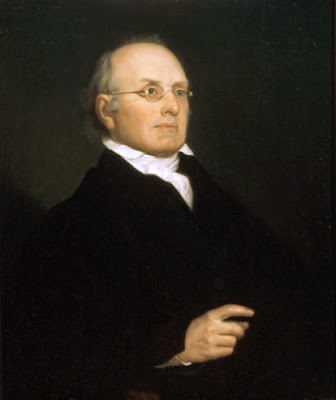I am a big fan of the original “Cosmos” TV series, made by Carl Sagan in 1980. Thus, when I heard that there was a 2014 reboot of the series, I had great interest in seeing it. It turned out to be not as good as the original series, although the newer series had its moments, and justified the cost of the purchase.
Thursday, September 22, 2022
Sunday, September 18, 2022
Alexis de Tocqueville often cited Judge Joseph Story
Joseph Story was a U. S. Supreme Court justice, appointed by President James Madison
In 1812, President James Madison appointed a new justice to the United States Supreme Court. That justice was Joseph Story. At the time that I write this, he is the youngest person ever to be nominated (let alone appointed) as a Supreme Court justice. He would influence a young lawyer named Abraham Lincoln, as I show in another post. But he would also influence a young Frenchman who once visited the United States in the 1830’s. That Frenchman was Alexis de Tocqueville, who would later become famous for a work entitled “De la démocratie en Amérique” (“Democracy in America”). The book contains many citations to Judge Joseph Story.
Joseph Story, a United States Supreme Court justice (appointed by James Madison)
Abraham Lincoln recommended Joseph Story, and Jefferson Davis criticized him
Joseph Story was a U. S. Supreme Court justice, appointed by President James Madison
In 1812, President James Madison appointed a new justice to the United States Supreme Court. His name was Joseph Story, the author of a three-volume work that I would like to read someday. The work is simply called “Commentaries on the Constitution of the United States.” Story had been a Supreme Court justice for more than 20 years, when he published this three-volume work in 1833. He did not leave the court until his death in 1845.
Joseph Story
Monday, September 5, 2022
A review of “Versailles” (French documentary)
“L’état, c’est moi.” (“I am the State.”)
– A line attributed to King Louis XIV of France – a line that he may or may not have actually said, but which nonetheless seems to accurately express his views on government (and himself)
Aerial view of the Palace of Versailles
A film about three kings of France, one of whom was executed …
In 1643, a new king was crowned in France. Officially, he would be known as Louis the Fourteenth, but he is also known by the nickname of “Le Roi Soleil” (or “The Sun King”). Some consider him the longest-reigning absolute monarch in history. The term “absolute” is appropriate here, because he ruled with an iron fist. But this film doesn’t just cover him – they also cover two other kings as well, both of whom were his descendants. One was Louis the Fifteenth, who is known by the nickname “Louis le Bien-Aimé” (“Louis the Beloved”). This nickname is somewhat ironic, because he became somewhat unpopular later on. And the other king was Louis the Sixteenth, who is best known for dying by the guillotine, when he was executed during the French Revolution. They were three kings in a row, with no other kings in between – either by the name “Louis,” or by any other name. Together, they reigned for a period of nearly a century and a half.
Execution of King Louis the Sixteenth by the guillotine, 1793
Sunday, August 28, 2022
A review of “St. Augustine” (audiobook)
In the fourth century CE, the Roman emperor Constantine converted to Christianity, causing many of his subjects to follow his lead in this regard. Thus, the Roman Empire had become Christian earlier in the century in which Augustine was born. They had also adopted the Nicene Creed, and its Trinitarian view of Godhood. At that time, the Roman Empire controlled North Africa, including a town called Hippo Regius. It was in this town that a woman named Monica (possibly a Berber) gave birth to him, raising him in the Catholic faith. Her very name “Monica” is often believed to be Berber, although Augustine’s father had a more Latin name which may indicate some degree of Romanization. It is unknown whether either one was a Berber or an Italian Roman.
Saturday, August 27, 2022
A review of “Georg Wilhelm Friedrich Hegel” (audiobook)
“What is rational is real; And what is real is rational.”
– Georg Wilhelm Friedrich Hegel’s “Elements of the Philosophy of Right” (1821)
In his youth, Karl Marx described himself as a “Young Hegelian” (or follower of Hegel). He liked a number of things about Hegel – such as his “dialectic,” which influenced Marx’s theory of the evolution of societies, leading gradually towards communism. (This Marxist theory is sometimes known as “historical materialism,” an application of Marx’s version of the dialectic.) Marx would later break with Hegel on a number of issues, but Hegel’s influence upon him was nonetheless quite profound. More than any other thinker, Hegel helped to shape the thought of the young Karl Marx, who would in turn shape the future of socialism and communism.
Wednesday, August 24, 2022
A review of Michael Wood’s “In Search of the Dark Ages”
During the Dark Ages, there were a number of invasions of what is today “England.” Some of them were before the state of England was created, while others of them happened long after its formation. But if you want a good television overview of these invasions, you’d be hard-pressed to find a better one than Michael Wood’s “In Search of the Dark Ages,” made for the BBC in the late seventies and early eighties.
Subscribe to:
Comments (Atom)










